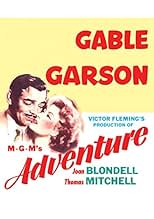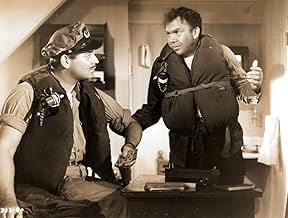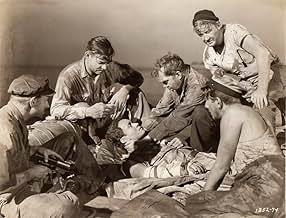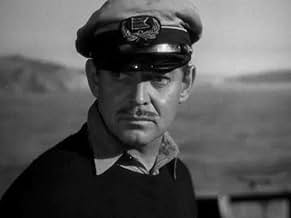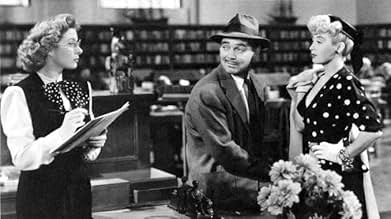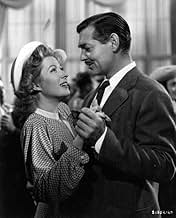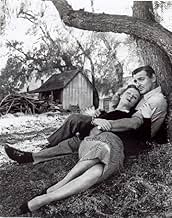IMDb RATING
6.1/10
1.3K
YOUR RATING
Dark, romantic, complicated drama about a rowdy merchant mariner and sophisticated librarian who clash over their lifestyles and values - and then fall in love.Dark, romantic, complicated drama about a rowdy merchant mariner and sophisticated librarian who clash over their lifestyles and values - and then fall in love.Dark, romantic, complicated drama about a rowdy merchant mariner and sophisticated librarian who clash over their lifestyles and values - and then fall in love.
- Awards
- 2 wins total
Stanley Andrews
- Bit Part
- (unconfirmed)
Florence Auer
- Landlady
- (unconfirmed)
Pedro de Cordoba
- Felipe
- (unconfirmed)
Rex Ingram
- Preacher
- (unconfirmed)
Garry Owen
- Jabbo
- (unconfirmed)
Harry Wilson
- Big Mug
- (unconfirmed)
Richard Abbott
- Clerk
- (uncredited)
Featured reviews
"Adventure" is an oddly generic title for such a singularly unique motion picture. Its superficial values are appealing enough--the Gable bluster is rarely put to such good use, and Garson is possibly the only actress with enough mettle to match him--but these attributes are hardly unusual and neither, indeed, is the storyline. What makes the effort favorably surprising is the story's aspiration to allegory through the use of poetics, which may occasionally seem overt but which never fail to ring true. It's an ambitious undertaking, and it works.
In its time, the movie was dismissed for being both formulaic and even crude, which in itself betrays either an ignorance of its higher aspirations or, more likely, a reluctance to take them seriously. America in 1945 prided itself on street smarts and industrial might; on its not being taken for a sucker. It had saved Europe from the axis forces and was about to embark on a socioeconomic boom such as the world had never seen: It wasn't interested in philosophical musings about the nature of the soul. The idea that these musings could be given dimension in a simple and often predictable story about a rakish sailor and a repressed librarian drove reviewers to pronounce the script "foolish" and the poetic commentary "gibberish."
But it is these very elements, this oddly ardent coloring, that have somehow deepened and mellowed with time, and which now provide the film with the kind of rich, subtle flavor found in only the most treasured vintages. More unique still is that the movie is less interested in the sentimentality of its story than in the metaphysical questions it poses. Its chief accomplishment is in avoiding any academic exploration of such questions (a choice which parallels the arc of the story itself), and it does so by illustrating with large, colorful brushes. Only the intelligence of the director and the skill of his actors keep the proceedings from veering off into caricature, a tipping point that when straddled with such finesse is delightful viewing indeed.
In its time, the movie was dismissed for being both formulaic and even crude, which in itself betrays either an ignorance of its higher aspirations or, more likely, a reluctance to take them seriously. America in 1945 prided itself on street smarts and industrial might; on its not being taken for a sucker. It had saved Europe from the axis forces and was about to embark on a socioeconomic boom such as the world had never seen: It wasn't interested in philosophical musings about the nature of the soul. The idea that these musings could be given dimension in a simple and often predictable story about a rakish sailor and a repressed librarian drove reviewers to pronounce the script "foolish" and the poetic commentary "gibberish."
But it is these very elements, this oddly ardent coloring, that have somehow deepened and mellowed with time, and which now provide the film with the kind of rich, subtle flavor found in only the most treasured vintages. More unique still is that the movie is less interested in the sentimentality of its story than in the metaphysical questions it poses. Its chief accomplishment is in avoiding any academic exploration of such questions (a choice which parallels the arc of the story itself), and it does so by illustrating with large, colorful brushes. Only the intelligence of the director and the skill of his actors keep the proceedings from veering off into caricature, a tipping point that when straddled with such finesse is delightful viewing indeed.
Adventure (1945)
Surely the title is a huge pun, or a huge mistake. This is an adventure of a man who is no longer looking for the high seas and wartime survival, but the adventure of love with a woman who is not, at fist his type. It's not as bad as some of the reviews suggest, but there is something steady and normal and incipient about it all.
While featuring Clark Gable in the lead, and with the same director as Gone with the Wind a few years earlier, there is something stiff about it all, even the humor and fun. Greer Garson is the "serious" woman, someone who has to force herself to have fun, and Joan Blondell is the racy one, out for fun above all else. And if Gable seems suited to the crazy woman, he's clearly also set to be tamed by the other.
That's pretty much the adventure, after a few wild scenes from kicking down the door in Chile to getting torpedoed by the Japanese.
Garson can be impressive in her cultured way, but here she is hot and cold, on and off. It's partly her speeches are more words than meaning. There's nothing more boring than people talking about being exciting. If in one scene you'll be laughing as Gable and Garson trap some chickens, in the next you'll be forced to think deep thoughts about true adventure and true meaning—when in fact the meaning was in the chicken scene.
Blondell never quite gets her due in many of her movies because she plays against (or in contrast to) the leading female who is more grand, or more beautiful, or just more star powered than she is. Too bad. She's fun but she also has fabulous screen presence. That, to me, is what matters most (often) in this era.
The movie is too long in parts, and the theme wears thin after while. In the end it's about a sailor's life or the landlubber's, the first filled with freedom, the second with a home and a family. It's 1945, the soldiers are coming home—guess which side wins?
Surely the title is a huge pun, or a huge mistake. This is an adventure of a man who is no longer looking for the high seas and wartime survival, but the adventure of love with a woman who is not, at fist his type. It's not as bad as some of the reviews suggest, but there is something steady and normal and incipient about it all.
While featuring Clark Gable in the lead, and with the same director as Gone with the Wind a few years earlier, there is something stiff about it all, even the humor and fun. Greer Garson is the "serious" woman, someone who has to force herself to have fun, and Joan Blondell is the racy one, out for fun above all else. And if Gable seems suited to the crazy woman, he's clearly also set to be tamed by the other.
That's pretty much the adventure, after a few wild scenes from kicking down the door in Chile to getting torpedoed by the Japanese.
Garson can be impressive in her cultured way, but here she is hot and cold, on and off. It's partly her speeches are more words than meaning. There's nothing more boring than people talking about being exciting. If in one scene you'll be laughing as Gable and Garson trap some chickens, in the next you'll be forced to think deep thoughts about true adventure and true meaning—when in fact the meaning was in the chicken scene.
Blondell never quite gets her due in many of her movies because she plays against (or in contrast to) the leading female who is more grand, or more beautiful, or just more star powered than she is. Too bad. She's fun but she also has fabulous screen presence. That, to me, is what matters most (often) in this era.
The movie is too long in parts, and the theme wears thin after while. In the end it's about a sailor's life or the landlubber's, the first filled with freedom, the second with a home and a family. It's 1945, the soldiers are coming home—guess which side wins?
In his first film after World War II service in the Army Air Corps, Clark Gable settled down to a familiar character and one of his most familiar directors. Adventure was the last of five films that Gable did with Victor Fleming which also includes Gone With The Wind. This one never quite measured up to Gone With The Wind though.
Gable was literally met at the airport by Louis B. Mayer and rushed into this film. It was thought at the time that a film with current box office sensation Greer Garson was a can't miss item at the box office. Garson was coming off an Oscar she received in 1942 for Mrs. Miniver the year Gable went away to war.
The results were underwhelming, but seen over 60 years after it was first out show Adventure to be not a bad story at all. Gable fits comfortably into the part of the tough boatswain who loves the rollicking life at sea he leads. No woman is going to be tying him down, not one like prim and proper librarian Greer Garson. He likes them like her roommate Joan Blondell, sassy and out for a good time.
But Greer and her notions of settling down with home and family kind of get under his skin. It's what's led many a man to the altar.
Gable and Garson never worked together again, probably by mutual consent. Neither were each other's types on the screen and in life, but no one has anything to be ashamed of in Adventure.
Best performance in the cast is by Thomas Mitchell as Gable's friend and confidante. Mitchell plays the usual tragicomic alcoholic that he took a patent out on for the screen.
Another in the cast and former vocalist with the Xavier Cugat Orchestra is Lina Romay who is the woman we first see Gable with as the film opens. She would shortly be joining the Bing Crosby show as the featured female singer. That 'dame' who gets $20.00 for some conversation is none other than Barbara Billingsley aka June Cleaver. Who'd have thunk that one?
Though this one didn't set the world on fire, Gable's next two films, Homecoming and The Hucksters rank in my humble opinion as two of his very best. The King was ascending his throne again.
Gable was literally met at the airport by Louis B. Mayer and rushed into this film. It was thought at the time that a film with current box office sensation Greer Garson was a can't miss item at the box office. Garson was coming off an Oscar she received in 1942 for Mrs. Miniver the year Gable went away to war.
The results were underwhelming, but seen over 60 years after it was first out show Adventure to be not a bad story at all. Gable fits comfortably into the part of the tough boatswain who loves the rollicking life at sea he leads. No woman is going to be tying him down, not one like prim and proper librarian Greer Garson. He likes them like her roommate Joan Blondell, sassy and out for a good time.
But Greer and her notions of settling down with home and family kind of get under his skin. It's what's led many a man to the altar.
Gable and Garson never worked together again, probably by mutual consent. Neither were each other's types on the screen and in life, but no one has anything to be ashamed of in Adventure.
Best performance in the cast is by Thomas Mitchell as Gable's friend and confidante. Mitchell plays the usual tragicomic alcoholic that he took a patent out on for the screen.
Another in the cast and former vocalist with the Xavier Cugat Orchestra is Lina Romay who is the woman we first see Gable with as the film opens. She would shortly be joining the Bing Crosby show as the featured female singer. That 'dame' who gets $20.00 for some conversation is none other than Barbara Billingsley aka June Cleaver. Who'd have thunk that one?
Though this one didn't set the world on fire, Gable's next two films, Homecoming and The Hucksters rank in my humble opinion as two of his very best. The King was ascending his throne again.
This movie is better with each passing year. It is a semi-noir, pre-"reality" - psychological drama of intense beauty.
Clark Gable stars as a staunchly confirmed sea dog, crew leader (called a bos'n) and womanizer who is totally unprepared to meet Greer Garson's character, who forever changes his vision of what is possible in finding love with a woman. Academy Award winner, and beloved character actor Thomas Mitchell ("Uncle Billy" in "It's A Wonderful Life (1946)") plays his too-sensitive-for-this-world side-kick, who becomes Gable's conscience, but at a price.
The script of this drama is lyrically sublime, subtle and quite deep. The fire between the stars is evident and haunting. True 'soul-mate' love is the overt theme of this movie. Existence, conscience, and facing the pain and limits of life, so that you may truly pass into adulthood, are more themes explored here. I view this film regularly once a year and am always inspired by its deep message and raw powerful performances. This isn't your stock Gable. This is a bittersweet post-war love poem.(Really! E. B. Browning is quoted to great effect!)
Gable's "Harry Patterson" has seen tragedy and loss (as had Gable himself, recently losing the love of his life, wife Carole Lombard). He is made restless in search of "it" which he believes only exists in the danger and perils of sea voyaging. He is sickened by the way shipwrecked people, alive and on edge, once rescued, quickly become bored and lose that passionate awareness of their own lives. He is searching for that life where he stays excited and in the passionate present (probably true of many returning war soldiers in 1945).
In Garson's "Emily Sears" he sees "it" for the first time in a woman's eyes. He is intrigued by her equivalent strength and wit, and simultaneously threatened by the risk of pain in losing her. Their love develops as a series of intense battles. She sees a "caged animal" and for the first time a man she might really respect, even though she feels he needs to be reached through all of his rebellion...and rescued.
His actions are escapist (and make great movie scenes)...but sailing away to forget his new "queen," he finds things have changed and we know, as do the other characters, that it is the end of his former life ...even if he doesn't. "Emily" bravely allows "Harry" to figure it out for himself. She doesn't demand any change in him, instead she sends him off to find "it" and risks being without the man that she loves for the rest of her life. Her majesty the queen of MGM, Greer Garson, has never been lovelier.
Joan Blondel is a juicy, ripe 'tomato'(the returning soldiers must have hooted and hollered!). Lina Romay makes an incredible "girl in distant port" and even sings a bit!
Thomas Mitchell is the stand out support. He plays Mudge, the soul and conscience of the free spirited Gable and perhaps of the whole film. He brilliantly helps unite a lost sailor & seeker with what his heart truly seeks.
Watch this film and let it be poetry... just let it play as you marvel at the writing and the actors' eyes. I predict that this movie is about to be rediscovered in a big way. ( By you?)
Clark Gable stars as a staunchly confirmed sea dog, crew leader (called a bos'n) and womanizer who is totally unprepared to meet Greer Garson's character, who forever changes his vision of what is possible in finding love with a woman. Academy Award winner, and beloved character actor Thomas Mitchell ("Uncle Billy" in "It's A Wonderful Life (1946)") plays his too-sensitive-for-this-world side-kick, who becomes Gable's conscience, but at a price.
The script of this drama is lyrically sublime, subtle and quite deep. The fire between the stars is evident and haunting. True 'soul-mate' love is the overt theme of this movie. Existence, conscience, and facing the pain and limits of life, so that you may truly pass into adulthood, are more themes explored here. I view this film regularly once a year and am always inspired by its deep message and raw powerful performances. This isn't your stock Gable. This is a bittersweet post-war love poem.(Really! E. B. Browning is quoted to great effect!)
Gable's "Harry Patterson" has seen tragedy and loss (as had Gable himself, recently losing the love of his life, wife Carole Lombard). He is made restless in search of "it" which he believes only exists in the danger and perils of sea voyaging. He is sickened by the way shipwrecked people, alive and on edge, once rescued, quickly become bored and lose that passionate awareness of their own lives. He is searching for that life where he stays excited and in the passionate present (probably true of many returning war soldiers in 1945).
In Garson's "Emily Sears" he sees "it" for the first time in a woman's eyes. He is intrigued by her equivalent strength and wit, and simultaneously threatened by the risk of pain in losing her. Their love develops as a series of intense battles. She sees a "caged animal" and for the first time a man she might really respect, even though she feels he needs to be reached through all of his rebellion...and rescued.
His actions are escapist (and make great movie scenes)...but sailing away to forget his new "queen," he finds things have changed and we know, as do the other characters, that it is the end of his former life ...even if he doesn't. "Emily" bravely allows "Harry" to figure it out for himself. She doesn't demand any change in him, instead she sends him off to find "it" and risks being without the man that she loves for the rest of her life. Her majesty the queen of MGM, Greer Garson, has never been lovelier.
Joan Blondel is a juicy, ripe 'tomato'(the returning soldiers must have hooted and hollered!). Lina Romay makes an incredible "girl in distant port" and even sings a bit!
Thomas Mitchell is the stand out support. He plays Mudge, the soul and conscience of the free spirited Gable and perhaps of the whole film. He brilliantly helps unite a lost sailor & seeker with what his heart truly seeks.
Watch this film and let it be poetry... just let it play as you marvel at the writing and the actors' eyes. I predict that this movie is about to be rediscovered in a big way. ( By you?)
You have to see the movie to learn what "it" refers to. You will also learn how to lure chickens properly, how to regain your "soul", what San Fran looked like in 1945, how to attract a woman by dating her roommate, how to throw rocks at your lover, how snappy dialogue and lively acting can be much more entertaining than the 90% of the c**p in today's "subtle" acting movies. No "adventure" here in today's terms but quite daring and emotional in its own way.
Did you know
- TriviaAny reports of this film's financial failure are false. Variety (January 8, 1947) listed it as the #7 box office hit of 1946. (It was released December 28, 1945.) The film earned more than $6M worldwide and earned a profit for MGM.
- GoofsWhen the Buckleys drive away from Emily's house in the country, a clear reflection of the boom microphone can be seen on the right rear passenger window and other areas of the highly-polished car as it drives off.
- Quotes
Harry Patterson: There ain't a dame I can't forget in six months.
- ConnectionsFeatured in Clark Gable: Tall, Dark and Handsome (1996)
- SoundtracksDown in the Valley
(a.k.a. "Birmingham Jail")(uncredited)
- How long is Adventure?Powered by Alexa
Details
Box office
- Budget
- $3,500,000 (estimated)
- Runtime2 hours 5 minutes
- Color
- Aspect ratio
- 1.37 : 1
Contribute to this page
Suggest an edit or add missing content


